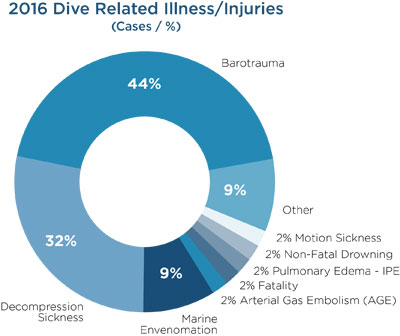Because of the extreme pressures
found in diving, injuries can occur as a result of
the changes in pressure and its affect on the
volume and density of the air that you breath from
your air tank. As was demonstrated in an early
image, when under 10m of water (33ft) there is an
equivalent force of two atmospheres of pressure
pushing on your body as well as compressing the
air inside of you. If a diver rises to the surface
too quickly while holding their breath, the gasses
can expand inside of their lungs causing them to
rupture. Over expansion injuries are not limited
to the lungs but can take place in any part of the
body that has air in it such as the sinuses or
inner ear. Due to the smaller volume of these
spaces even small changes in depth can change the
volume/pressure of the air inside of your
body.This is why it is critical to not hold your
breath when you dive but instead breathe normally
as it allows the excess air to escape. While you
might be tempted to hold your breath for short
periods of time to "extend" your bottom time, this
is not a good plan as it increases your chance of
injury and does not actually improve you time
underwater. While over expansion and barotrauma is
not the the only type of injury caused by diving,
it is the most commonly experienced injury
according to the Diving Safety Network (DAN).

